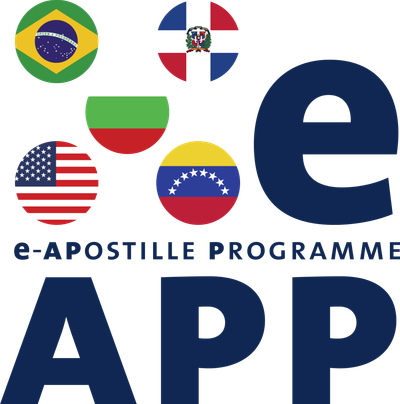e-APP Progress in Five Contracting Parties

Despite the current limitations on cross-border mobility, public documents still require authentication for presentation abroad. The realities of the current global situation have led many authorities and jurisdictions to more seriously explore innovative ways to enhance their issuance and authentication procedures, in many cases offering remote and online solutions.
For over a decade, the electronic Apostille Programme (e-APP) has supported the electronic issuance and verification of Apostilles for Contracting Parties to the HCCH 1961 Apostille Convention, but these recent developments have made the e-APP and its implementation more relevant than ever.
Over the course of recent months, the Permanent Bureau has been informed of new implementations of e-APP components in five Contracting Parties to the Convention. There are now 41 Contracting Parties operating at least one component of the e-APP, including 18 which have implemented both the e-Apostille and e-Register components. This is testament to the significance and success of the programme and the continuing relevance of the Apostille Convention.
Brazil began issuing e-Apostilles nation-wide. Apostilles, including e-Apostilles, can be verified in the new e-Register. More information is available on the Brazilian National Council of Justice website, here.
Bulgaria, the National Centre for Information and Documentation (one of Bulgaria’s Competent Authorities under the Convention) also began issuing e-Apostilles, these can be checked against its e‑Register. Bulgaria already operates e-Registers under the Ministry of Justice, the regional administrations, and the Ministry of Foreign Affairs.
The Dominican Republic began issuing e-Apostilles nation-wide. Apostilles, including e‑Apostilles, can be verified in the existing e-Register.
Venezuela also expanded the application its e-Apostille component to cover an additional category of public documents. Venezuelan Apostilles, including e-Apostilles, can be verified in the existing e-Register.
Montana became the first state in the United States of America to implement both the e-Apostille and e‑Register components. The efforts of the Montana Secretary of State were particularly significant as the first e-Apostille was issued for a public document which had also been electronically notarised. The Montana e-Register is available here.
The Permanent Bureau congratulates the Competent Authorities of these Contracting Parties and is looking forward to hearing more about these and the many other e-APP implementations during the 12th International Forum on the e-APP and the next meeting of the Special Commission on the practical operation of the Apostille Convention. These meetings are tentatively scheduled for October 2021, to coincide with the 60th Anniversary of the Apostille Convention and will provide an opportunity for the exchange of best practices and an exploration of the latest technological developments in the context of both the Convention and the e-APP.
For more information, visit the Apostille Section of the HCCH website.